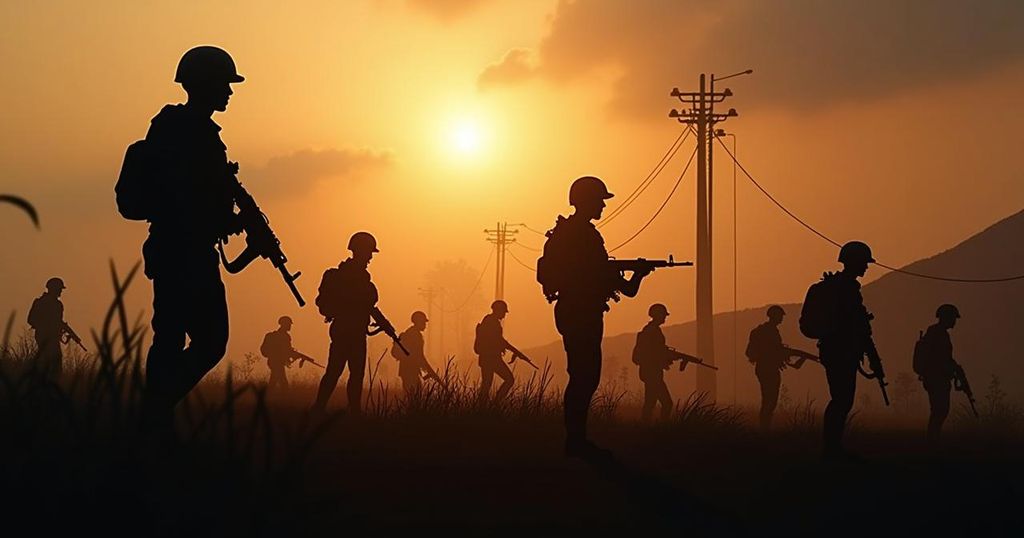Six migrants from Egypt, Peru, and Honduras died after Mexican soldiers opened fire near Tapachula, with ten others injured. President Claudia Sheinbaum labeled the event “deplorable” and announced the investigation of the two soldiers involved. The incident marks one of the deadliest attacks against migrants by Mexican authorities, recalling prior incidents of violence in the region linked to military and police operations against migrants.
MEXICO CITY (AP) — A tragic incident occurred near Tapachula, Mexico, where six migrants, including individuals from Egypt, Peru, and Honduras, lost their lives following gunfire from Mexican military troops. The killings, described as “deplorable” by President Claudia Sheinbaum, highlight ongoing tensions surrounding migration and military actions along Mexico’s southern border. Of the deceased, three were identified as Egyptians, with one each from Peru and Honduras; the sixth victim has yet to be named. At least ten other migrants sustained injuries during the shooting, although their current conditions have not been disclosed. Peru’s Foreign Ministry has acknowledged the death of one of its citizens and has called for an “urgent investigation” into the event, reflecting the deteriorated diplomatic relations between Peru and Mexico since a diplomatic dispute in 2022. President Sheinbaum has stated that the two soldiers who discharged their weapons on Tuesday—reported to be her first day in office—have been handed over to civilian authorities for inquiry, although they have not faced formal charges yet. This incident is the most severe recorded killing of migrants by state authorities in Mexico since a 2021 case in Tamaulipas, where seventeen migrants were killed. Sheinbaum has indicated that a thorough investigation will determine whether any commanding officers will be held accountable, asserting, “A situation like this cannot be repeated.” Despite these pledges, she did not address the incident further during a ceremony where military leaders pledged loyalty, asserting that, “In our country, there is not a state of siege, there are no violations of human rights,” while promising wage increases for military personnel. The shootout transpired as soldiers claimed the vehicle transporting migrants disregarded orders to stop, allegedly feeling threatened by shots fired from the convoy, thereby leading them to return fire. The Attorney General’s Office later commented that military personnel reported being fired upon during their pursuit of the fleeing trucks. Ultimately, two of those initially injured succumbed to their wounds, confirming that all deceased migrants died from gunshot injuries. The area has a notorious history linked to migrant smuggling and cartel violence, with the Defense Department reporting that the vehicles involved resembled those typically used by criminal organizations. Rights activists and local authorities have criticized the use of lethal force in this incident and called for accountability, underscoring that similar incidents have occurred in past years involving military factions and migrant transports.
The ongoing migrant crisis in Mexico highlights the complex relationship between militarized responses to migration and human rights issues. The use of military forces in policing migrant routes has frequently drawn scrutiny, particularly concerning incidents where migrants have been injured or killed. This situation is exacerbated by the criminal activities of drug cartels, which have increasingly exploited the migrant smuggling trade, resulting in a surge of foreign migrants paying higher fees for transit through Mexico. Past events, such as the killing of seventeen migrants in Tamaulipas by police and a similar instance involving the National Guard, have set a precedent for violence against migrants, leading to calls for a re-evaluation of military involvement in law enforcement activities. President Claudia Sheinbaum’s administration faces the challenge of balancing national security interests with the ethical treatment of migrants, particularly as international scrutiny over border enforcement rises. Peru’s demand for accountability following the deaths of its citizens is indicative of growing diplomatic concerns that may arise from such incidents. This context is crucial to understanding the broader implications of the recent tragic events; they are not isolated occurrences but rather part of a larger narrative concerning how migration is managed within Mexico’s political and military frameworks.
The recent shooting incident in Chiapas, Mexico, resulting in the deaths of six migrants, has prompted urgent calls for accountability and investigations into military conduct concerning migrants. As President Claudia Sheinbaum takes office, this tragic event underscores the critical need for a more humane approach to migration policy amidst a climate fraught with cartel violence and human rights violations. The reactions from concerned nations and rights groups reflect a growing awareness and potential repercussions regarding Mexico’s treatment of migrants, calling for systemic changes to prevent future tragedies. The ongoing investigation into the actions of the military personnel involved will be pivotal in shaping both domestic and international perceptions of Mexico’s handling of migration and border security.
Original Source: apnews.com







